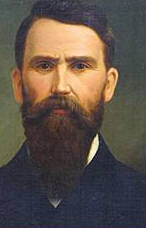James Philip Eagle facts for kids
Quick facts for kids
James Philip Eagle
|
|
|---|---|
 |
|
| 16th Governor of Arkansas | |
| In office January 8, 1889 – January 14, 1893 |
|
| Preceded by | Simon Pollard Hughes, Jr. |
| Succeeded by | William Meade Fishback |
| Member of the Arkansas House of Representatives | |
| In office 1873–1874 1877–1878 1885–1886 |
|
| Speaker of the Arkansas House of Representatives | |
| In office 1885–1887 |
|
| Preceded by | W. C. Braley |
| Succeeded by | John Marshall Hewitt |
| Personal details | |
| Born | August 10, 1837 Maury County, Tennessee, U.S. |
| Died | December 20, 1904 (aged 67) Little Rock, Arkansas, U.S. |
| Resting place | Mount Holly Cemetery, Little Rock, Arkansas, U.S. 34°44′15.3″N 92°16′42.5″W / 34.737583°N 92.278472°W |
| Nationality | American |
| Political party | Democratic |
| Spouse | Mary Kavanaugh Eagle |
| Signature | |
James Philip Eagle (born August 10, 1837 – died December 20, 1904) was an important American politician. He served as the 16th Governor of Arkansas. He was also a leader in the Southern Baptist Convention, a large group of Baptist churches.
Contents
Early Life and Family
James Philip Eagle was born in Maury County, Tennessee. When he was young, his family moved to Arkansas. He went to public schools there. In 1882, he married Mary Kavanaugh Oldham. Her brother, William Kavanaugh Oldham, also became a politician in Arkansas. He even served as acting governor for a short time. James Eagle's younger brother, Kies Oldham, worked as his personal secretary when James was governor.
Military Service and Education
Before the American Civil War, James Eagle worked as a deputy sheriff in Prairie County, Arkansas. When the war started, he joined the Confederate States Army. He became a colonel, which is a high rank. He fought in many battles with the Army of Tennessee. He was hurt during the Atlanta Campaign.
After the war ended, Eagle went to Mississippi College. He studied there for less than a year. He had to leave because he got sick. Later, he studied to become a minister and was ordained as a Baptist preacher.
Political Career
James Eagle served in the Arkansas House of Representatives from 1873 to 1878. This is where laws are made for the state. He supported Governor Baxter during a conflict known as the Brooks–Baxter War. In 1875, he became the Speaker of the House. This means he was the leader of the representatives. From 1880 to 1904, he was also the president of the Baptist State Convention in Arkansas.
Serving as Governor
In 1888, James Eagle was elected Governor of Arkansas. He was reelected for a second term in 1890. As governor, he worked to bring more people to Arkansas. He also strongly supported education. Governor Eagle was open to the idea of women's suffrage, which meant women having the right to vote. He even welcomed Susan B. Anthony, a famous leader for women's rights, to Arkansas.
Church Leadership
Beyond politics, Eagle was very active in the Baptist church. In 1902, he was elected president of the Southern Baptist Convention. This is a very important role in the Baptist church. He was reelected to this position two more times. He continued to be a leader in the church.
Eagle also served on a commission to build the state capitol building. However, Governor Jeff Davis removed him from this role. This happened because Davis thought Eagle was supporting someone who was running against him. Governor Davis was not in favor of building the new capitol at that time.
Later Life and Death
James Philip Eagle died at his home in Little Rock, Arkansas, on December 20, 1904. He passed away from heart failure. He is buried in the historic Mount Holly Cemetery in Little Rock.
Images for kids

